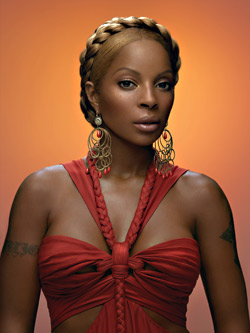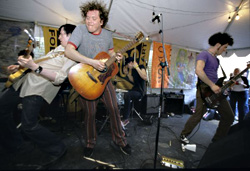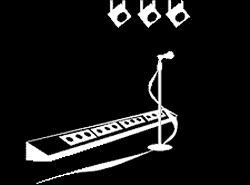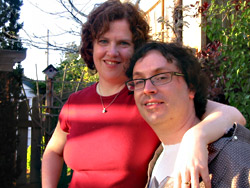Shortly before his death, Otis Redding famously remarked, “I just lost my song. That girl took it away from me.” He was speaking, of course, of Aretha Franklin’s scorched-earth retooling of “Respect.” Don’t hold your breath waiting for Bono to gracefully cede “One” to Mary J. Blige; she’s already absconded with U2’s signature power ballad. At this year’s Grammy ceremony, Bono sang the first verse and chorus before Blige swept in. However you interpret it—a lovers’ confrontation? An AIDS patient staring down his father?—the lyric “Did you come here to play Jesus to the lepers in your head?” coming from these steaming pipes replaces a hushed accusation with the riot act. The vocal flights that seem mere cries for attention from Whitney Houston or too many American Idol contestants reflect a true desperation when Blige takes off.
The same arrangement, with additional keyboard and guitar parts, climaxes Blige’s current album, The Breakthrough (Matriarch/Geffen). During her 15-year career, the singer has watched the mainstream welcome her blend of soul singing and rap sensibility while she also moved toward the establishment. Once a bratty roughneck known for erratic stage behavior and an interview showdown with model/author Veronica Chambers, Blige now stands assuredly on equal footing with the rock superstar class: In addition to U2, her résumé includes appearances with Elton John and Sting.
No matter how friendly with the National Academy of Recording Arts and Sciences she becomes, though, it’s Blige’s post-hip-hop R&B that still pays the bills. With the help of a tune (“Be Without You”) that’s topped Billboard’s black-singles chart for three months, The Breakthrough is sure to pass the triple-platinum My Life (1994) and Share My World (1997) as her biggest seller. Echoes of the ’70s sounds (Philly soul, the Emotions) that have rooted her music from day one account for some, but hardly all, of the album’s hooks. Vocally, she provides her own call and response; she also introduces Brook, a rapping alter ego who’s more effective than the guest shots by Jay-Z and 50 Cent. (Jay-Z is strictly a tagalong on “Can’t Hide From Luv,” merely assuring us of the obvious: “This is beautiful music, ladies and gentlemen!”)
Like Oprah, Blige (“I’m just Mary”) retains her cred while moving in an ever higher orbit. Self-dramatization has been her thing since the opening moments of her debut, What’s the 411? She’s tracked her changes from album to album, promising “no more drama in our lives” on one of her most indelible singles, “Family Affair.” Some of this was false bravado, she confesses in The Breakthrough‘s “MJB da MVP.” Her recent happiness is (for once) the real thing, she implies, but memories of bad times aren’t forgotten. “I didn’t get a hug from Daddy, that’s why I need a hug from you,” she unshyly informs her new love on “Father in You.” “Good Woman Down” is an ode to “my troubled sisters,” who are assured that “I still have troubles, too,” and invited to “use my songs as remedy.” Even Aretha’s bond with her audience was never this explicit a two-way street.
That that street still has plenty of room for her is clear from The Breakthrough‘s massive sell-through. Blige’s long-running popularity now links mothers and daughters in a way that few singers have managed since hip-hop became dominant. Everyone loves a soap opera, sure, but that alone doesn’t explain this woman’s success any more than it did Fleetwood Mac’s. It’s what’s in the grooves that counts, and The Breakthrough‘s promise is that the groove isn’t gonna stop now.
Too much neosoul registers as “nice,” a talisman of good taste, and goes no farther; is anyone truly jonesing for another Jill Scott record? Van Hunt’s On the Jungle Floor (Capitol; out Tuesday, April 4) sets out to prove more than just his familiarity with the era of bell-bottoms and Innervisions. Hunt, an Atlanta-based singer-songwriter who’s also Grammy-ready—he’s one of the few performers who escaped this year’s Sly Stone tribute with honor intact—treats the music as a playground.
Jungle is ’70s creamy, but shows the influence of the subterranean experiments of Marvin Gaye and Shuggie Otis as much as the decade’s more straightforward moments. Spiky, homemade-feeling touches dot the disc; at one point, Hunt cracks himself up as he shakily demonstrates what an octave is. His love songs are cheeky—one object of his affection “just can’t help being a girl.” “She must have a spy workin’ on the inside,” he guesses of the subject of “Suspicion (She Knows Me Too Well).” All the while, his music, whether the bump and grind of “Being a Girl” or the rock-style stomp of “Ride, Ride, Ride,” works imaginative twists on ready-mades.
Hunt is also smart enough to find the critique of gangsta-ism hidden within Iggy Pop’s “No Sense of Crime” (obviously a closet punk, he also borrows the Ramones’ rallying cry “Today your love, tomorrow the world” for the sex jam “Hot Stage Lights”). He may be even more of a genuine weirdo than D’Angelo. At the least, On the Jungle Floor can hang alongside Voodoo in any old-schooler’s or new-schooler’s changer.








